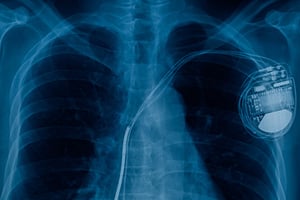Capacitor Sourcing for Your Medical Device Application
Select a reliable capacitor for medical devices
 Capacitors are one of the many components that contribute to the overall longevity of an implantable medical device; making a small component change could extend its reliability, and even its lifespan, by preventing battery related complications. Here we explore the cost of device failures and how proper reliability testing and supplier considerations can help you navigate capacitor sourcing for your medical device application.
Capacitors are one of the many components that contribute to the overall longevity of an implantable medical device; making a small component change could extend its reliability, and even its lifespan, by preventing battery related complications. Here we explore the cost of device failures and how proper reliability testing and supplier considerations can help you navigate capacitor sourcing for your medical device application.
Advances in medical devices and medical implantables continue to improve patient outcomes in a range of applications from pace makers to pain management. Building and designing health solutions that stay in step with innovation takes dedication from research and development, regulatory and operations among others. When applying the business lens, balancing value and reliability is a constant consideration. Patient safety is paramount; however, making effective cost decisions becomes increasingly complex when other factors are on the line.
When implantable devices fail, everyone pays a price—including patients. For example, cardiac resynchronization therapy, or CRT, is a clinically proven heart failure treatment option for certain heart failure patients. It’s designed to improve the heart’s ability to pump blood and oxygen by sending small electrical impulses to the ventricles of the heart to restore a synchronized pattern. In combination with a complete therapy program, CRT has the potential to improve quality of life for patients by reducing symptoms of heart failure and increasing exercise capacity.
Download this white paper to learn:
- Implantable Cardioverter Defibrillator (ICD)
- Cardiac Resynchronization Therapy (CRT)
- Designing for long-term reliability
- Requirements for medical grade capacitors
- Testing guidelines and considerations
- Considerations for choosing a supplier
- Value of proprietary designs
